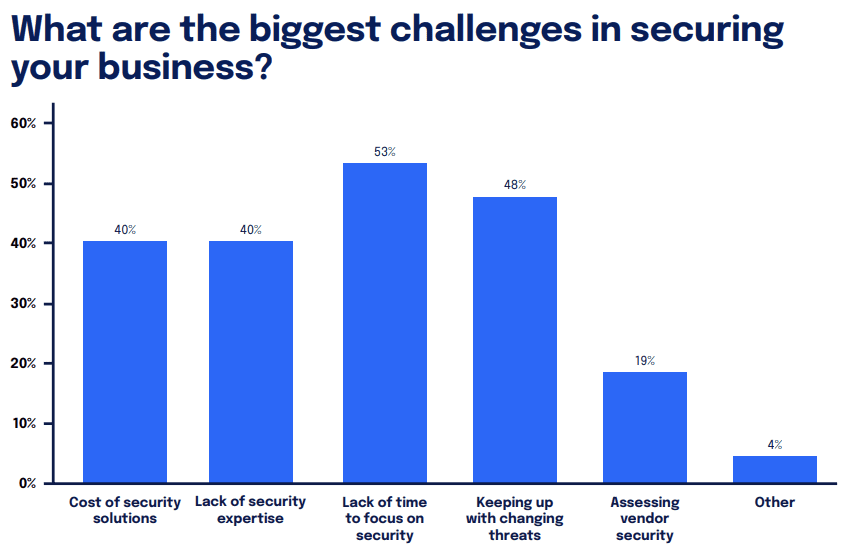The threat of cybersecurity breaches has become a critical concern for businesses, as the consequences of such attacks can range from loss of customer trust to revenue losses due to system downtime. As a result, many companies have been increasing their security measures, from training employees to implementing two-factor authentication and allocating more resources to their security teams.
However, small businesses and startups face more cybersecurity challenges, as they must balance the need for cybersecurity with limited resources. In this article, we delve into the state of cybersecurity among small and medium-sized businesses (SMBs) and explore the challenges they face in protecting themselves from cyber threats.
Lack of time is one of the top cybersecurity challenges for SMBs
According to a study by DigitalOcean, small businesses are increasingly recognizing the importance of cybersecurity, with over half (54%) reporting a greater concern about the issue compared to one year ago.
Upon analyzing the primary cybersecurity challenges faced by SMBs and startups in securing their operations, it was found that 53% cited a lack of time to focus on security as a major challenge. This was followed by difficulties in keeping up with changing threats (48%), the cost of security solutions (40%), and a shortage of security expertise (40%).
Additionally, 19% of respondents cited challenges in assessing vendor security.

As per the study, in 2023, lack of time to manage security emerged as the top security concern among SMBs (25%), followed by worries about data loss or theft (23%), ransomware attacks (12%), and DDoS attacks (10%). This suggests that many small businesses struggle to allocate sufficient resources to maintain their security systems, which can leave them vulnerable to a range of security threats.
Approximately 38% of the surveyed SMBs reported having no employees solely responsible for security, while 42% had only one employee responsible for security.
Despite limited resources, SMBs are taking measures to safeguard their business against cyber-attacks. More than half of the surveyed SMBs implemented two-factor authentication, 41% implemented firewalls or security applications, and 37% implemented password or access controls. Only 15% of SMBs surveyed did not implement any security measures in the past year.
However, the survey suggests that SMBs face significant challenges in dedicating time and budget to manage security. Only 6% of the surveyed SMBs have increased their security budget or headcount in the past year. This suggests that many SMBs will continue to struggle with limited resources to focus on security.
57% of SMBs have zero employees dedicated to data privacy
The field of data privacy is relatively recent, and therefore, small businesses may not be prioritizing recommended data protection measures along with safeguarding their assets from other types of attacks. While 74% of businesses consider data privacy a primary concern, the majority (57%) lack any staff exclusively dedicated to data privacy. Only 42% state that they have one to five individuals focused solely on data privacy.
To safeguard their data, companies need to focus on reviewing the security and data protection policies of third-party vendors, including cloud providers and other technology vendors.
It was found that 62% of respondents would ask for legal agreements, such as data protection agreements and privacy policies, from their cloud and technology vendors.
Additionally, 57% would request regulatory requirements, like GDPR, HIPAA, or FedRAMP, while 29% would ask for certifications, such as SOC and ISO.
By mandating that vendors adhere to these requirements, companies can ensure the security of their business and customer data.

In conclusion, small businesses are aware of the importance of cybersecurity and data privacy. However, they often lack the necessary resources, budget, and personnel to address these issues effectively. As a result, SMBs face ongoing challenges in maintaining a high level of security, especially in the face of the constantly evolving threat landscape. Failure to dedicate resources to this area can result in customer attrition, reputation damage, and revenue loss. Therefore, small businesses need to prioritize cybersecurity and data privacy and work closely with their vendors, including cloud providers and security products, to create and maintain a secure environment.
Source: DigitalOcean
Read next: Only 15% of organizations have a mature level of cybersecurity readiness – Cisco study








